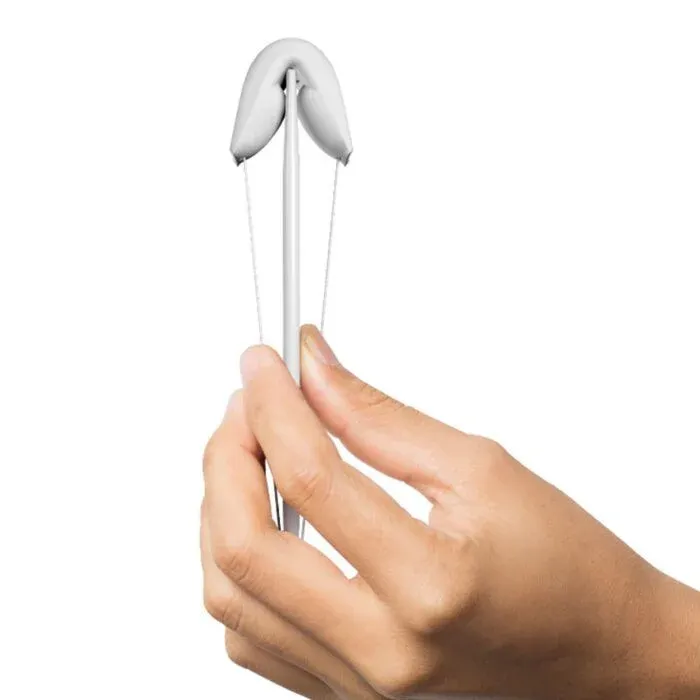Fanny Farts: Definition, Causes and How to Stop
Embarrassing to say the least, vaginal wind is the butt of many a joke - but trust us, it's no laughing matter! Fanny farts have earned themselves a whole new language with terms ranging from queef or queefing, Brazilian breeze, Victory Honk, V puff, Pussy Farts and Quif.
What are Fanny Farts?
- A Fanny fart or queef is the rapid expulsion of air that's been trapped inside the vagina. This results in a 'fart-like' sound.
- A warning sign that your pelvic floor is not in good shape and your muscle tone is weak. If muscle tone is weak, the vagina fills with air which when released causes a 'fart-like' sound. It’s a sign that your pelvic floor would benefit from pelvic floor exercises!
What a Fanny Fart is not
- Odourous and smelly. It's not like flatulence; it is not 'gas' or 'wind' which emanates from the bowel. If there is a bad smell then this could be a sign of a vaginal or rectal fistula. A fistula is a tear between the anus and vagina through which gas from the bowel (as well as faeces) escapes into the vagina. A fistula requires specialist medical treatment and medical help should be sought.
- The sign of a vaginal infection. The urban myth that a 'fanny fart' is an infection causing the build-up of bad gas is just not true!
What causes fanny farts?
Fanny farts happen all the time and are completely normal. They mostly occur during penetrative sex or exercise.
It happens when air pockets become trapped in the vaginal canal and then are released over time, causing ‘fart-like’ sounds.
Aside from sex and exercise, fanny farts can also be caused by:
- Stretching – Certain exercises and stretching positions can make the likelihood of farting down there more likely.
- Inserting objects into the vagina – Fanny farts are almost always caused by air displacement. So, don’t be alarmed at any surprise noises down there – especially during a pelvic exam.
- Natural pelvic floor anatomy – Our bodies are unique, and everyone is shaped and built differently. Some people are naturally more prone than others to trapping and expelling air from their private parts. Studies also show over a third of women with weak pelvic floor muscles experience fanny farts.
- Pregnancy – It’s not actually known why pregnancy causes additional vaginal flatulence. But we do know it’s likely caused by over-worked pelvic floor muscles, hormone imbalances and natural changes to your body as the baby grows.
- Menopause – During menopause, your hormones are always fluctuating. It’s proven that declining oestrogen levels can make your vaginal wall weaker, more relaxed and more prone to popping during exercise.
How to Fanny Fart
A queef happens when air gets trapped inside the vagina. When you move unusually (i.e. during a yoga pose) or when your partner thrusts during sex, air is pumped into the vagina. The resulting sound is an embarrassing fart sound when the air is released!
So maybe you could just laugh it off. However, this means ignoring possible pelvic floor looseness. If you often experience queefing then your pelvic floor muscles are too weak.
Is it normal to fart from your private area?
The good news is fanny farts are completely normal and far more common than you think!
Aside from fistulas – which require both medical and surgical treatments – a bit of trapped air poses no gynaecological risks.
Apart from being slightly amusing or somewhat embarrassing, they’re a natural part of life and often nothing to worry about. However, if you are looking for some ways to reduce fanny farts…
Are fanny farts a sign of something serious
Other than being a potentially funny or somewhat awkward mood-killer in the bedroom, fanny farts are often nothing to worry about.
However, if you’re experiencing smelly fanny farts or unusual discharge, you may need to see a specialist as you could be suffering from a vaginal fistula.
Vaginal fistulas are small openings or tears in the vaginal wall which can open the door to discharge from other organs – such as the bladder or rectum.
This allows urine or stool to move through the vaginal canal, causing nasty infections and impacting your vaginal and sexual health as well as your confidence.
You should contact your doctor if you:
- Notice foul-smelling vaginal discharge
- Experience persistent and chronic vaginal infections or UTIs
- Experience pain during sexual intercourse
- Feel general irritation in and around the vulva or perineum
How to Stop Fanny Farts
If you're wondering how to keep your 'fanny' happy, follow Kegel8's top tips below:
- Pelvic floor exercise - Kegel8 is here to help every step of the way! By improving the tone of your muscles you will minimise 'looseness' within the vagina. We lose muscle tone as we get older, gain weight and have babies, but this is no excuse to ignore these vital muscles! Strengthening and targeted pelvic floor exercises is essential to maintain vaginal muscle tone and control of your bladder and bowels
- Choose sex positions that minimise vaginal wind - Doggy style can be a fanny fart nightmare! Usually 'woman on top' positions are good for preventing fanny farts because there's less space in the vagina, which when aroused does enlarge (sorry, that means more space for air too!). Some women report that by tensing their anus as if preventing a fart they can tense the muscles of the vagina. This minimises air pressure and the resulting embarrassment of vaginal flatulence.
- Yoga positions to stop fanny farts - Exercise is great for toning the pelvic floor, however certain yoga poses can fuel vaginal flatulence! Any inverted posture with your legs in the air creates space in the vagina as organs move downwards. This can suck air into the vagina, resulting in vaginal wind. This isn't a guaranteed vaginal flatulence cure but in 'fanny fart' prone poses keep your legs together and squeeze the anus. This helps to minimise the expansion of the vaginal walls and prevents air from being introduced.

Kegel8 Ultra 20 V2 Electronic Pelvic Toner

Contrelle Activguard Bladder Support Pessary

GYNTIMA Probiotic Vaginal Suppositories - Probiotica



